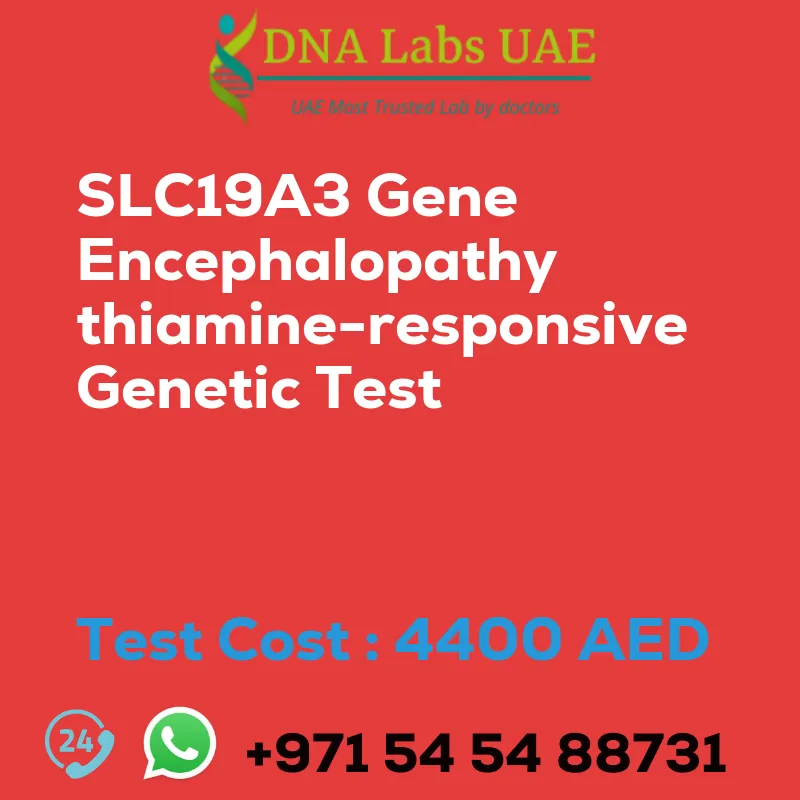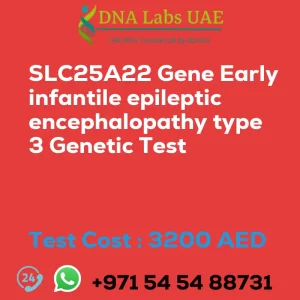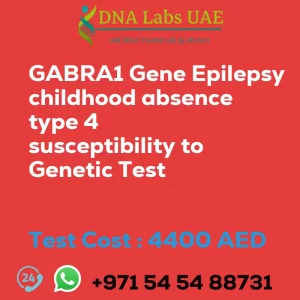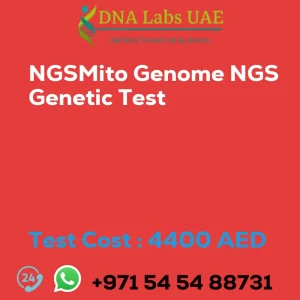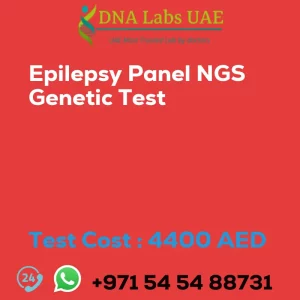SLC19A3 Gene Encephalopathy Thiamine-Responsive Genetic Test
Welcome to DNA Labs UAE, where we offer the SLC19A3 Gene Encephalopathy Thiamine-Responsive Genetic Test. This test is designed to diagnose and guide treatment decisions for individuals with SLC19A3 gene encephalopathy, a rare genetic disorder affecting the nervous system.
Test Components
The SLC19A3 Gene Encephalopathy Thiamine-Responsive Genetic Test includes:
- NGS Technology
- Neurological Disorders Test Type
- Genetics Test Department
Price
The cost of the SLC19A3 Gene Encephalopathy Thiamine-Responsive Genetic Test is 4400.0 AED.
Sample Condition
We accept the following sample conditions for this test:
- Blood
- Extracted DNA
- One drop Blood on FTA Card
Report Delivery
You can expect to receive your test results within 3 to 4 weeks.
Method
The SLC19A3 Gene Encephalopathy Thiamine-Responsive Genetic Test utilizes NGS Technology for accurate and comprehensive analysis.
Doctor
This test is recommended for individuals under the care of a Neurologist.
Test Department
The SLC19A3 Gene Encephalopathy Thiamine-Responsive Genetic Test is conducted in our Genetics Test Department.
Pre Test Information
Prior to undergoing the SLC19A3 Gene Encephalopathy Thiamine-Responsive NGS Genetic DNA Test, it is important to provide the clinical history of the patient. Additionally, a Genetic Counselling session will be conducted to draw a pedigree chart of family members affected with SLC19A3 Gene Encephalopathy Thiamine-Responsive.
Test Details
SLC19A3 gene encephalopathy is a rare genetic disorder that affects the nervous system. It is caused by mutations in the SLC19A3 gene, which is responsible for the production of a protein that transports thiamine (vitamin B1) into cells. Thiamine is essential for energy production and proper function of the nervous system.
Individuals with SLC19A3 gene encephalopathy may experience a range of symptoms, including developmental delay, seizures, movement disorders, vision problems, hearing loss, and cognitive impairment. The severity and specific symptoms of the disorder can vary widely.
The SLC19A3 Gene Encephalopathy Thiamine-Responsive Genetic Test utilizes next-generation sequencing (NGS) technology to identify mutations in the SLC19A3 gene. This comprehensive analysis of the gene allows for the detection of both common and rare mutations.
The results of this test can help diagnose SLC19A3 gene encephalopathy and guide treatment decisions. Thiamine supplementation has been shown to improve symptoms in some individuals with this disorder.
In addition, the test results can provide information about the likelihood of passing on the disorder to future generations, which can be helpful for family planning decisions.
For more information or to schedule a test, please contact our DNA Labs UAE.
| Test Name | SLC19A3 Gene Encephalopathy thiamine-responsive Genetic Test |
|---|---|
| Components | |
| Price | 4400.0 AED |
| Sample Condition | Blood or Extracted DNA or One drop Blood on FTA Card o |
| Report Delivery | 3 to 4 Weeks |
| Method | NGS Technology |
| Test type | Neurological Disorders |
| Doctor | Neurologist |
| Test Department: | Genetics |
| Pre Test Information | Clinical History of Patient who is going for SLC19A3 Gene Encephalopathy thiamine-responsive NGS Genetic DNA Test A Genetic Counselling session to draw a pedigree chart of family members affected with SLC19A3 Gene Encephalopathy thiamine-responsive |
| Test Details |
SLC19A3 gene encephalopathy is a rare genetic disorder that affects the nervous system. It is caused by mutations in the SLC19A3 gene, which provides instructions for making a protein that transports thiamine (vitamin B1) into cells. Thiamine is essential for energy production and proper function of the nervous system. Individuals with SLC19A3 gene encephalopathy may experience a range of symptoms, including developmental delay, seizures, movement disorders, vision problems, hearing loss, and cognitive impairment. The severity and specific symptoms of the disorder can vary widely. A genetic test using next-generation sequencing (NGS) can identify mutations in the SLC19A3 gene. This test can help diagnose SLC19A3 gene encephalopathy and guide treatment decisions. Thiamine supplementation has been shown to improve symptoms in some individuals with this disorder. NGS genetic testing involves sequencing the entire coding region of the SLC19A3 gene, as well as nearby non-coding regions that may affect gene expression. This approach allows for comprehensive analysis of the gene and can identify both common and rare mutations. Results of the test can help determine the likelihood of passing on the disorder to future generations and inform family planning decisions. |

